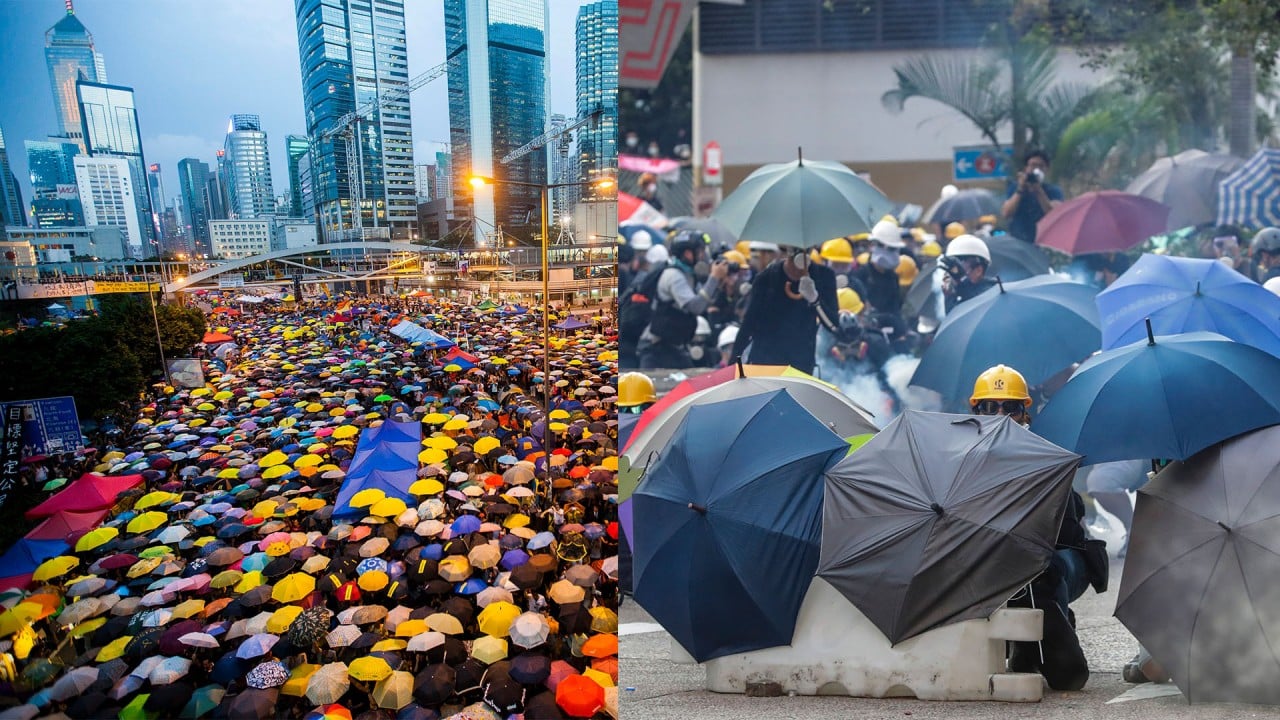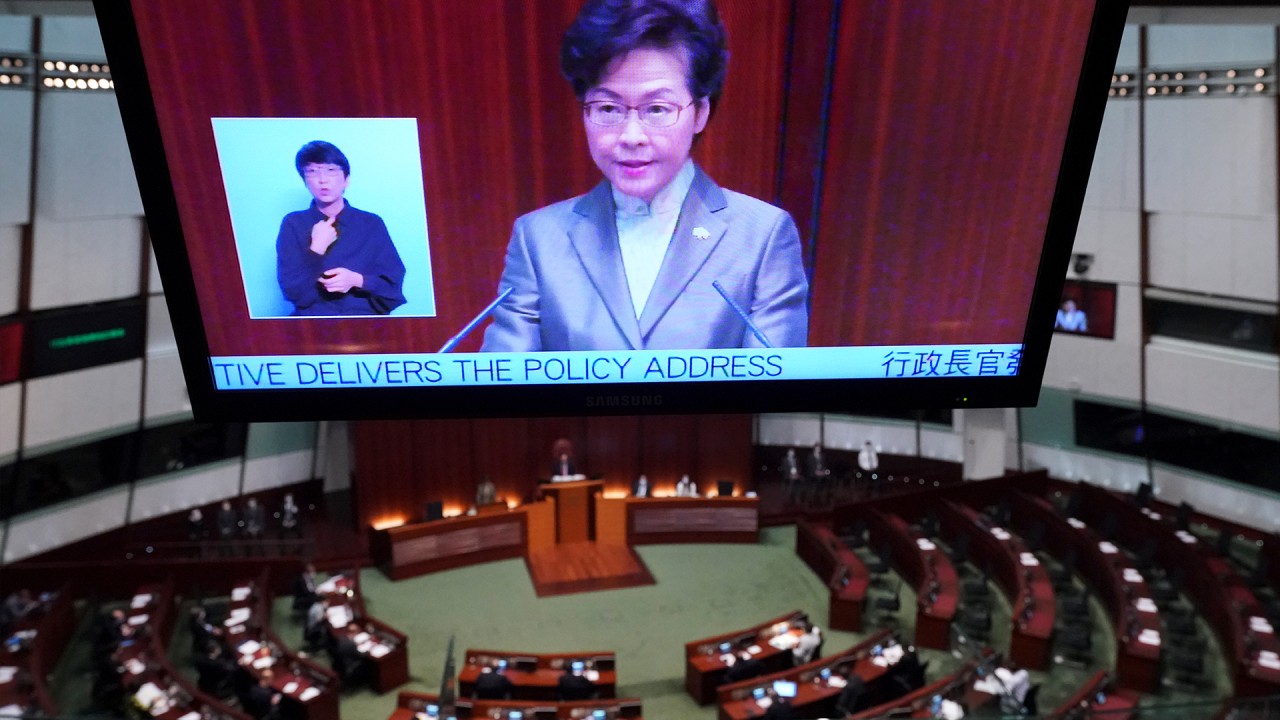
How Hong Kong’s policy address history explains the city’s present struggles
- The changes in the number of references to democracy, consensus, youth and inequality in policy addresses since the handover reveal that our leaders have abysmal political reflexes, are elitist and have failed to translate talk into action
It was over the Christmas break five years ago that, with little better to do, I set myself a mind-numbing challenge. I ploughed through all the policy addresses from 1998 to 2015, and counted the number of times chief executives Tung Chee-hwa, Donald Tsang Yam-kuen and Leung Chun-ying had used four words: democracy, consensus, inequality and youth.
But first, a reprise of what I found back in 2015. All three of the chief executives paid lip service to “democracy” – Tsang in particular, who on average used the words “democracy” or “democratic” around six times in each policy address.
Tung mainly ignored democracy in his policy addresses, but made up for it in 2005 with three references to it as he continued to focus on “people-based governance”. It was clear even then how much political lip service could be given to commitments that so often came to nothing.

Most frustrating to me at that time was the steady obsession with “consensus”. The word was repeatedly on the lips of our first three leaders – Tsang took it to a crescendo in his policy addresses in 2006 and 2007 with over 10 references in each address. Failure to achieve a consensus was repeatedly used through numerous inconclusive consultations as an excuse for policy inertia.
The obsession with “consensus” has always frustrated me because I see no role for consensus in politics. Modern complex societies are riddled with large, perfectly reasonable differences of opinion. The very essence of democracy is to broker those differences.
Indeed, the concept of democracy is fundamentally founded on recognition that consensus is a utopian ideal that in the real world cannot be achieved – and that to be held hostage to it can only lead to political paralysis.
The democratic process, commonly underpinned by party politics, is about leaders building coalitions around compromises bundled together in manifestos. If your coalition manages to win political office on the basis of your manifesto, then that vote delivers the mandate needed to push through policies even when minorities disagree, often for good and sensible reasons.

In obsessing about “consensus”, our three first leaders demonstrated their fundamental failure to understand what democracy is about, and a reluctance to acknowledge or tolerate that differences of opinion can be reasonable, natural and normal. The obsession also hobbled their policymaking power.
It's time to scrap tedious Hong Kong policy address
Tung by and large ignored the issue of youth – except in his 1998 address when he was focusing on education reform. By the time Tsang came into office, youth challenges could no longer be ignored, and were attracting specific mention, particularly on youth development.
And Leung, confronted by Occupy Central protesters, paid huge attention to the challenges faced by our young – with references rising to the mid-30s between 2014 and 2016. So much good this attention did him.

08:41
Five years after Occupy: comparing Hong Kong’s 2014 movement with the 2019 extradition bill protests
It also explains her administration’s appalling deafness to the deteriorating public mood, as sharp and repeated economic reversals – from the 1998 Asian financial crisis, to the severe acute respiratory syndrome outbreak in 2003 and the 2008 global financial crisis – entrenched the financial difficulties of a large part of Hong Kong’s working population.
Carrie Lam’s epic policy address reveals a sobering truth
Surprisingly, the word “consensus” has disappeared. After being used nine times in her 2017 address and seven times in 2018, the word has never been used since.
I suspect this has less to do with any realisation that consensus is a naive and utopian political ideal, and more to do with a recognition that division in our community has never been so deeply or severely entrenched. To use the word at present would be to invite ridicule.

04:47
Hong Kong leader Carrie Lam delivers 2020 policy address
Perhaps predictably, concern about the challenges facing our millennials has surged. Lam used the word “youth” 23 times in 2017 and 34 times in 2018. After a lighter touch in 2019, (she used the word just four times), there was a resurgence to 28 references in the 2020 policy address.
One might say better late than never, except that the continued lack of interest in democracy or inequality suggest that Lam remains deaf to the particular livelihood challenges faced by the young.
Of course, this word search exercise reflects nothing more than the lip service that our leaders have given to these issues. As we saw with Tung’s focus on democracy in 2004, Tsang’s sudden surge of interest in inequality in 2011, and Lam’s recent heightened interest in youth, the rhetoric has rarely led to improvements of substance.
Perhaps the main insight is that our leaders retain abysmal political reflexes, remain profoundly elitist and have consistently failed to translate lip service into substance.
Lam seems to have abandoned “consensus” – not because she has developed a new-found fondness for democracy, but because consensus is so far out of reach. That augurs ill as she prepares the ground for Legislative Council elections now nine months away.
David Dodwell researches and writes about global, regional and Hong Kong challenges from a Hong Kong point of view

